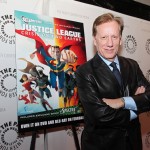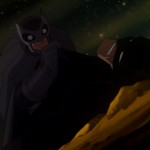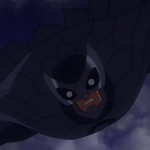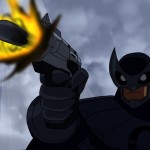TWO-TIME EMMY AWARD WINNER JAMES WOODS
GIVE EVIL A SUBTLE TOUCH AS OWLMAN IN
JUSTICE LEAGUE: CRISIS ON TWO EARTHS
Nobody captures villainy quite like James Woods. The two-time Emmy Award winning actor steals his every scene as the voice of Owlman in Justice League: Crisis on Two Earths, an all-new DC Universe Animated Original PG-13 Movie now available from Warner Premiere, Warner Home Video, DC Comics and Warner Bros. Animation.
In Justice League: Crisis on Two Earths, a “good” Lex Luthor arrives from an alternate universe to recruit the Justice League to help save his Earth from the Crime Syndicate, a gang of villainous characters with virtually identical super powers to the Justice League. What ensues is the ultimate battle of good versus evil in a war that threatens both planets and, through a diabolical plan launched by Owlman, puts the balance of all existence in peril.
Woods was the lone member of the cast not to record his lines in the presence of voice director Andea Romano and producer Bruce Timm, instead setting up shop in Providence, Rhode Island to record via ISDN line. You’ll never notice. In Owlman, Woods has crafted an affecting, subtly evil performance that brings forth a truly memorable villain in a film packed with the world’s most famous super heroes.
With two Emmy Awards and two Oscar nominations, Woods has drafted an impressive resume, capturing audiences’ imaginations with one memorable performances after another. In addition to Academy Award nods for his roles in Salvador and Ghosts of Mississippi, Woods’ list of films includes The Onion Field, Once Upon a Time in America, Against All Odds, The Hard Way, Diggstown, Casino and Contact, to name a few. Woods is featured in the upcoming remake, Straw Dogs. Woods’ television work has included his recent primetime series, Shark, as well as Emmy nods for Rudy: The Rudy Giuliani Story, Indictment: The McMartin Trial, Citizen Cohn and a guest role on ER. He received Emmys for his performances in My Name is Bill W. and the Hallmark telefilm, Promise.
Woods has spent more than his share of time bringing characters to animated life, parlaying his devilishly hilarious role as Hades in Disney’s 1997 film Hercules into its 65-episode television series follow-up. Since then, Woods has also voiced roles in animated film from Surf’s Up and Final Fantasy: The Spirit Within to Recess: School’s Out and Stuart Little 2. He has also had a recurring role on Family Guy and Disney’s House of Mouse.
Justice League: Crisis on Two Earths is an original story from award-winning animation/comics writer Dwayne McDuffie (Justice League). Bruce Timm (Superman Doomsday) is executive producer, and Lauren Montgomery (Wonder Woman, Green Lantern: First Flight) and Sam Liu (Superman/Batman: Public Enemies) are co-directors. The full-length animated film is now available from Warner Home Video as a Special Edition 2-disc version on DVD and Blu-Ray™ Hi-Def, as well as single disc DVD, and On Demand and Download.
Woods chatted after his recording session – and at the New York premiere of the film last week – about the collaborative aspects of animation, his aspirations to play villainous sidekicks, the importance of super heroes for today’s society, and his inclination never to develop a super power. Stick around, it gets better …
QUESTION:
What makes Owlman a great character?
JAMES WOODS:
Owlman is a very, very modern character. He’s really the doppelganger of Batman who, himself, of course, is a very Dark Knight, torn in his motivations, wanting to avenge the death of his parents. Ultraman is the leader of the Crime Syndicate, but he’s just a tough guy who solves things more with the blunt end of a bat. He’s all brute force. Owlman is the brains of the organization, and he is a thinker, which is ironic in that his greatest strength is really his ultimate undoing.
Owlman is a very calculating, dangerous individual because of his extraordinary brain power. And at the same time, it causes him to have incredibly dark, existential reservations about his acts. He’s very self-destructive and self-loathing. The whole future of the multiverse may be in his hands in our story.
QUESTION:
Knowing all of that, how did you choose to implement those characteristics into the vocal performance?
JAMES WOODS:
You know, this process of creating a comic brought to life is very interesting, especially a sophisticated comic like this story. I had a thought of his being a very sardonic, almost charmingly sarcastic character. But I started to think that that was a little bit like Heath Ledger’s wonderful performance in The Dark Knight as the Joker. And I must say that Andrea (Romano) and Bruce (Timm) were very helpful in helping to interpret the character. We settled on a very existential, depressed man, almost like a Jacobian character, who sort of feels that nothing matters. And there’s nothing more dangerous than a man who has his finger on the trigger and believes that nothing matters.
It’s a wonderful character to work on because you have to do certain things with your voice. I’m a very passionate, animated actor. There are people like William Hurt, a wonderful Academy Award-winning actor, who are great at being very spare in the use of their voice. I am a guy who’s a little more dynamic, so for me to repress myself, it leads to a kind of different character than I usually get to do. It’s a lot of fun for me to play something that’s not innately or instinctively what I would do. And then the great collaboration comes from these wonderful artists, including the director, the producer, the writer. Everybody has an artistic vision of how things should be and, when you work together, you come up with some confluence of ideas that creates a unique character. I really think we came up with something nice.
QUESTION:
Can you elaborate on the romantic side of Owlman?
JAMES WOODS:
In our story, Owlman and Superwoman have this strange, power-hungry kind of, I won’t call it love affair, but certainly a strange attraction. And it is the dark side of love, so it involves all kinds of power and domination. Owlman really makes her need him without giving her any kindness. That’s the nature of a dark, dark character like this. So they have this really brutal, bitter kind of love. And to get that kind of tone into it was kind of strange, because it’s not what love would be about. So you have to do things that are kind of counterintuitive, but it’s fun to try it.
QUESTION:
What’s the joy for you in playing a villain, particularly this type of cerebral one?
JAMES WOODS:
Villains are the best characters to play because the possibilities are really quite endless. A hero has certain things that we expect of him or her, while a villain can be pretty far out there. Owlman wants to destroy everything, and yet is fascinated by how the world became so awful, in his mind. And he blames it on man and on choice.
All the things that we as civilized human beings celebrate – the freedom of being able to choose and to have free will – Owlman sees as the source of chaos throughout the universe and the alternate universes. He sees everything wrong in all of these universes as being a permutation of choice. I think most people would agree that choice has allowed people to create, to put man on the moon and write Hamlet. And people can aspire to do good. Owlman see the opposite — he sees the celebration of evil as a way of asserting one’s meaning in life, and the way to have meaning is to have things be meaningless. It’s a strange, strange thought, but there are pretty sophisticated 20th century existential philosophers who’ve said the same thing. It’s pretty impressive to realize that comic books get that fundamental in terms of a philosophical understanding of the human condition. It’s much more sophisticated than you expect when you get involved with doing an animated super hero movie.
QUESTION:
Is that a direct reflection of why comics are so popular?
JAMES WOODS:
Comics have never really talked down to their audience. The comics have always respected what the audience wants. I have always said that one of the greatest faux pas made by the denizens in the film business is that they tend to want to put their own personal points of view – whether they be political, spiritual, religious, whatever – on their stories and promote their own agenda rather than respect what the audience is looking to hear and see. We should get into their wheelhouse and not be ashamed to sell a hero to people who love the idea of good versus evil. You know good versus evil worked great for Sophocles? It worked great for Shakespeare and it certainly works great for Batman and Superman, Wonder Woman and Green Lantern … and Owlman.
QUESTION:
Was there a stash of DC Comics on your nightstand as a kid?
JAMES WOODS:
I don’t know anybody in America who didn’t read Superman and Batman. I was young enough that I actually watched George Reeves on television, and when he took off, I would believe it like any other kid. It was amazing that he was flying around in that black and white television. He used to hop and probably crash on a set of cardboard boxes right off the camera. But to me, there he was – Superman – flying around, saving the day.
I actually liked the idea of Superman because it was so pure. I liked the guy who was kind of away from his own home and, in a kind of way, a little lonely, but trying to do good in a place where he was always kind of an outsider. Batman always disturbed me because he was so dark and so full of sadness and rage. It’s interesting because playing Owlman is full of an emotion that is actually probably less angry and vengeful, and almost demonic in its passion than Batman. Owlman’s darkness is such an empty void of soullessness.
And yes, I’ve always been a fan of the comics, especially in their reflection of the times. Our country has gone through enormous cultural changes in the past 50 years, and DC Comics was always very hip to those changes. They weren’t afraid of them. They just wanted to ride with them. They know their audience.
QUESTION:
Would you like to be a super hero?
JAMES WOODS:
I like the idea of being Owlman. He’s got it made. Think about it. The dark side of all these superpowers is that, as a super hero, you’re always inclined to use them for everybody else. What makes that so great? You’re sitting around, the clicker in hand. You’re in your nice old pajamas, you’ve got your Uggs on, you just settled in to watch Gladiator for the 58th time. You got some popcorn, the pizza just arrived – it’s gonna be terrific. And suddenly it’s “Oh crap, they just blew up the U.S. Mint!” And I’ve got to put on that rubber suit – and don’t forget the talcum powder – and rush into action. Who wants to wear latex all the time? Harvey Fierstein? Not me. I don’t want any superpowers. If they offer, I’ll politely decline.
QUESTION:
You’ve played a lot of characters in both live-action and animation. What role are you still waiting for?
JAMES WOODS:
I would like to do a doofy henchman. I’m always the guy in control. I’m always going to destroy the universe and then I’m gonna go get a sandwich. (he laughs) I’d like to be the guy who says “Hey, I can go and get the sandwich for you while you destroy the universe, and then we can go get some key lime pie.” I’m so tired of being the “A” personality in the villainy department. Give me the goofy henchman. I think that would be fun.
QUESTION:
When you portray real life figures like cops and lawyers, you can research, you can talk to cops, you can talk to lawyers. In playing a superhero, what kind of research did you do before you stepped into the booth?
JAMES WOODS:
That is an interesting thing that people don’t understand about animated work. The voice actor does a lot to create the character. It’s amazing. I mean, obviously the writers and the directors and the producers have set up months or years of work to prepare it. But I’ve been in situations where, unfortunately, maybe an actor was replaced, not because he was doing a bad job, but because it just wasn’t working somehow. It’s a very unique thing. For all these big animated movies, no matter who you are, you audition. Mel Gibson at the height of his career, had to audition. Everybody does – because they want to hear the voice, and sometimes you come in with a slant that will bring the character to life. I did a television series called Shark. I played a very sophisticated lawyer, a very dark guy. We had a former Dream Team district attorney as one our technical advisers. Five of the writers were lawyers. So we had all the resources to make the characters real. But there’s no place you can go to ask how a super hero behaves. You don’t get to ask those questions. You kind of have to figure it out. So you go in with an open mind and things kind of just come to you.
Sometimes you really fall flat on your face, and I’m sure we all have. But by and large, usually everybody figures it out together. And it’s fun. Really fun. I love doing these animated films because I think the actor has a great deal more input into the creation of the character than he or she does when you’re doing a real-life film, even though there’s a lot more acting involved when you’re being photographed. In animation, you have the possibility of improvising. We work alone and use a great deal of imagination, and rely just on our instincts to create the character.
QUESTION:
Was there any particular scene in the script that stood out for you?
JAMES WOODS:
There’s a wonderful sequence in this story where Owlman and his opposite spiritual twin, Batman, have a confrontation about the future of the multiverse, all the universes, all the earths that were created. And it was a very sophisticated conversation about the existential meaning of life. I’m reading this thing and thinking, “This is a comic book character talking?” I mean, it was very sophisticated, and I found myself wondering how you would do that.
I thought, this is like The Remains Of The Day with Anthony Hopkins — it’s that kind of character. He’s a character speaking with such a loss of any ability to dream for anything good. It was all about a dark, empty void of the meaningless existence. When you read something that deep, you find yourself instinctively going to a better level of performance. So it wasn’t a challenge so much as an invitation to be unique and maybe better.
QUESTION:
Have you had any reaction from your fans – or the legions of fanboys – to your playing the role of Owlman?
JAMES WOODS:
They talk about fanboys and the Comic-Con audience and so on, calling them geeks and such. But I have to tell you – those guys know what they like, and they embrace the hard work that goes into these stories. And it’s really fun to give them what they want, because I’m a fanboy at heart. I’m much older than the usual base, but I have to say – I love these characters. And I love being one of them. I would be Owlman forever. I love the concept.
QUESTION:
Why do you think super heroes important today to people?
JAMES WOODS:
I think there aren’t a lot of heroes in the world today because there aren’t a lot of clear cut battles. It’s really hard to know who the enemy is today. I don’t know who the enemy is. I know we are at war, but I don’t know who the enemy is. And I don’t think anybody else does. It’s like the enemy is famine and despair and the banality of evil. In comparison, World War II was easy. Hitler was a good enemy – a dark character who did heinous things to millions and millions of people, and enlisted the help of others who may or may not have been inclined to do so until he inspired them to be at their worst.
But in this day and age, there are people who hate people that other people completely admire. And the people who admire that person are decent people. I think our politics are so divisive in this country and so bitter because I don’t think anybody on either side of the political divide has a bad intention. I think they want things to be good, they just see a very, very different way of going about it. And yet they’re so hard on each other. I’m always disappointed by how negative and petty people are on either side of the equation in politics. And that’s a symbol of how disruptive our spirituality is right now in the world. I think that’s why super heroes are important because, in the long run, at the end of Act III, their triumph is something that fills us with joy because their triumph is a clear cut victory in a world where almost nothing is clear cut.
For more information, images and updates, please visit the film’s official website at www.JUSTICELEAGUECRISIS.com.
Below are links to an all-new clip from Justice League: Crisis on Two
Earths that features Owlman:
http://raincloud.warnerbros.com/wbol/us/whv/med/justice_league/crisisontwoearths/clips/jlcote_destroyIt_500.asx
Podcast: Play in new window | Download
Subscribe: RSS





